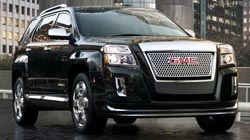automotive
Drivers Grip SUVs Despite High Gas Prices
- by Karl Greenberg , April 10, 2012
 Hard to believe, but gasoline prices -- now at around $4 per gallon -- are not sending U.S. new-vehicle buyers running from SUVs. Although gasoline is around
25 cents higher now than it was this time last year, utilities are the top replacement choice, with small cars coming in third. This is according to AutoPacific's March 2012 Fuel Price Impact
Survey.
Hard to believe, but gasoline prices -- now at around $4 per gallon -- are not sending U.S. new-vehicle buyers running from SUVs. Although gasoline is around
25 cents higher now than it was this time last year, utilities are the top replacement choice, with small cars coming in third. This is according to AutoPacific's March 2012 Fuel Price Impact
Survey.
Among the approximate 1,200 U.S. consumers surveyed, 76% said they would replace their current vehicle with a similarly sized one, whereas only 18% said they would go smaller. And over half -- or 59% -- said that economic conditions are having no effect on their vehicle buying intentions.
Of the third who said higher fuel prices would actually cause them to change their vehicle replacement choice, they qualified that by saying it would take about a 93-cent jump from what they are paying now.
advertisement
advertisement
The study also found that consumers have a propensity to stay within the vehicle segment they like, regardless of most outside forces. Almost 30%, for instance, said they own an SUV -- and that same percentage says they would choose one for their replacement as well. About 19% would choose a small car -- two percentage-points higher than current respondent ownership. This is a stark contrast to the July 2008 fuel price spike, when the top replacement choice was small cars at 32% of the sample -- 12 percentage points higher than current ownership at that time.
So how high would prices have to go now for consumes to really change vehicle segments? About a third of respondents said fuel would have to cost about $4.80 per gallon for these respondents to choose a different vehicle -- or $0.93 more compared to what they said they were paying. However, 47% of survey takers note that fuel price increases would not cause them to change vehicle type, and 42% of those respondents say that even $10/gallon gas would not persuade them to change vehicle type.
A third of consumers said they would cut discretionary purchases instead of getting a smaller vehicle. Thirty-four percent said they would cut out movie and music purchases; 34% fast food; and 32% going out. And 42% said fuel price increases have little to no effect on their discretionary purchases. Although a long-term purchase, vehicle-buying intentions show a similar trend. When asked whether current economic conditions -- including fuel costs -- have made them more or less likely to buy or lease a vehicle in the next year, 32% say "less likely." Fifty-nine percent said economic considerations would have no effect on their vehicle choice.




